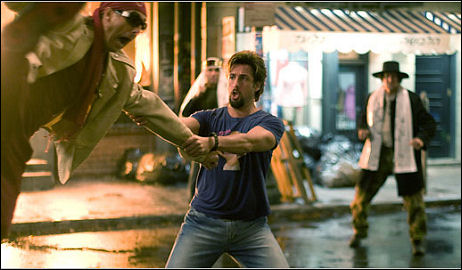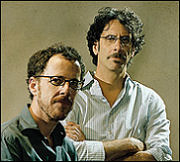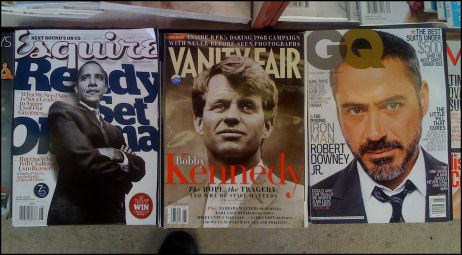A special amendment needs to be added to the Constitution stating that all citizens have to pass a short general education and political literacy exam before being allowed to vote. Something analagous to the 25-question quiz that everyone is required to take at their local DMV in order to get a driver’s license. Nobody squawks about this because driving carefully and responsibly is a life-or-death matter. But then so is voting. Much more so, if you ask me.
And so I’m asking myself a simple, fundamental question, to wit: why shouldn’t voters have to prove they have at least a somewhat educated awareness of basic political and social issues before being granted the power to vote? This seems to me like a completely reasonable suggestion. Really. Tell me why it’s not fair.
As Bill Maher mentioned two or three weeks ago, the shitkickers who voted for George Bush in ’00 and ’04 because he seemed more personable and prole-friendly than Al Gore or John Kerry (which he was…I’ll give him that) screwed things up badly for the rest of us. Look at the mess we’re in! We’re in a bad recession, caught in a ghastly no-win war that’s going keep draining us and lead our nation into even worse debt, the dollar is worth nothing overseas, gas is over $4 a gallon.
And — face facts — it’s all the fault of the social conservatives who swallowed the Karl Rove bait — the idea that Republicans are (a) better at looking out for the nation’s safety and (b) care more about bedrock values than the Democrats — hook, line and sinker. It was a bullshit line and they fell for it. And they screwed us all in the bargain.
Democracy can’t work and in fact can bring great harm to a nation as long as people with demonstrably flawed judgment — people who refuse to consider candidates and issues in a grown-up, semi-educated way, and who insist on voting for candidates as if they’re contestants on the Dating Game, or as if they’re running for church pastor or Boy Scout leader.
There’s a sizable percentage of people out there — 10% or 12% of respondents in a poll I read recently — who apparently believe that Barack Obama is a muslim. In all sincerity, our nation would be much better off if somehow these people could be disenfranchised as voters. People like that woman who asked Obama during the Philadelphia debate why he hasn’t worn a flag pin — her voting rights need to be cancelled for life. There are millions like her out there, and they’re a menace.
I’m not saying voters have to vote for Democrats or support liberal values, but there should be a rule that they have know their shit and not plan on voting based on emotional concerns about community values. Is it such a bad idea that prospective voters would be tested to see how dumb they are, and if they don’t get 70 % of the questions correct, they don’t get to vote? Seems pretty fair to me. I’m not trying to provoke people by doing one of my nutter rants. I’m completely serious.
Social conservatives who vote over bedrock moral values rather than political and economic realties (and some kind of shrewd assessment of the leadership abilities and allegiances of presidential candidates) are going to kill this country. They’re the children in the room…the fools, the drunkards. Things have gotten too serious and we really can’t mess around with these people any more. For the sake of our country, an effort needs to me made to thin our their ranks in terms of voting eligibility.
Here’s a discussion from a discussion board that I found this morning. http://www.gupshupp.com/forums/sitemap/t-1532.html
“In our idea of democracy we have one person one vote. A professor of political science or economics has the same vote as a 18 year old apprentice. Say your vote depended on your level of education. 1 vote for all but an extra vote for an A-level education — 2 for degree level — 3 for postgratuate, etc.” Another excellent idea!
“Would this change politics? Would we still have the same personality-based politics we now have? Would it change the balance of power to the right or to the left? Or would it not make a difference at all? Would it be acceptable and if not, why?”
Month: May 2008
Coupla Guys in a Booth
Anne Thompson alerted me this morning to A.J. Benza and Neal Gumpel‘s “Real Guys” series — obviously a concept riding the coattails of Marcia Nastair and Lorenzo Semple‘s “Reel Geezers.” Here‘s their riff on 21.
I agree with Thompson that the Geezers offer more interesting insights and issues, but Benza and Gumpel feel like the real thing to me. They process and talk about movies in the manner of “real guys” (i.e., men who enjoy saying it straight but at the same time have some sort of trepidation about being too intellectual). It’s culturally valid, it’s fairly unpretentious and it adds to the national dialogue so I don’t see a problem. Are they Andre Bazin and James Agee? No, but are they pretending to be?
$100 Million Dollar Man
If Iron Man makes $100 million by late tonight, fine. Obviously good news all around, particularly for Jon Favreau (who will now be offered the grade-A material along with the other cream-of-the-croppers), Robert Downey, Jr. (whose career was on the ropes ten years ago) and the Marvel guys, who were probably driving around town last night in ostentatious babe-magnet cars and lighting their cigars with $100 bills.
And I’m not going to rain on everyone’s mood parade this morning by repeating the old maxim about the success of superhero movies being a direct reflection of feelings of impotency (or a sense of being overwhelmed or crushed by tumbling tides) among 45-and-under males. Because it’s not true!
Except it kind of is. Around the fringes, sorta kinda. I know that real men have their own inner and outer power, whatever that may amount to or however they may define it, and that every day them wake up, grim up and live with that thing.
I liked Iron Man — it gave me no pain and only a little remorse — but let’s have no illusions about what’s really going on here. Apart from the pure enjoyment of Downey’s hipster attitude, some excellent dialogue, high-quality CG, the joy of killing Middle Eastern terrorists and all that.
Death in Kentucky
Straight from Mark Halperin‘s The Page: “YOU CAN’T MAKE THIS UP: Hillary Clinton enthusiastically picked a filly named Eight Belles to win the Kentucky Derby and compared herself to the horse. Eight Belles finished second. The winner was the favorite, Big Brown. Eight Belles collapsed immediately after crossing the finish line, and was euthanized shortly thereafter.” (posted at 8:10 pm.)
Best Obama Endorsement
I can’t say I’ve watched very many celebrity endorsements on behalf of of Barack Obama, but Tom Hanks‘ video, which he apparently wrote and shot on his own, is the most eloquent and straight-talking-est testimonial on video that I’ve seen from…I was going to say from a Hollywood type but I can’t think of anyone who’s said it better. Really. It’s on his MySpace page.
Acid or Gasoline?
Last night In Contention‘s Kris Tapley took a second look at Iron Man with some paying customers, and thereby caught the new The Dark Knight trailer. He came away believing that cowriters Chris and Jonathan Nolan “may have taken some liberties” with the facial scarring of Harvey Two-Face Dent (being played this time by Aaron Eckhart).
Where Are They?
I’ve been in love with those brilliant TV spots for a major insurance company in which a couple of people are talking about insurance — quietly, almost half-heartedly — while one of them watches a calamity take place outside, and is verbally unresponsive to what he/she is seeing. He/she just keeps talking, but what’s happening down below is nothing sort of catastrophic. One of the spots shows a window-washer about to fall; another shows furniture being tossed out a window and landing on a guy’s car.
I love these spots — they’re almost Buneulian-level comments on how many of us take in the world while staying in the safety of our own little bubbles or membranes. HE reader “bmcIntire” sent along the above YouTube clip.
We Are The World
Someone asked last night what the most widely-shared statement might be among families or roommates, regardless of country, culture or economic station. Something that people say every day to others living under the same roof, millions of times daily, in every corner of the globe. And I said that the most common one of all might be “I wouldn’t go in there if I were you.”
Boys and Toys
My father taught me long ago by example that adulthood was a fairly grim calling — a state of mind that allowed for very little joy or spontaneity, that was mainly about duty and drudgery and — although he’s been in AA since the mid ’70s — a fair amount of drinking on weeknights and weekends. So I’ve been fairly averse to the idea of fulfilling my father’s idea of adulthood for most of my life.

from Adam Sandler’s You Don’t Mess With the Zohan
But sometimes I feel as if the pendulum has swung too far in the other direction, as N.Y. Times critic A.O. Scott points out in this piece about perpetual male adolesence as exemplifed by Adam Sandler‘s screen roles.
Adam Sandler, who will turn 42 on September 9th, “did not invent the archetype of the overgrown man-child, which has been around at least since the silent era,” Scott writes. “Nor has [he] been alone, over the past 15 years or so, in turning male infantile aggression into the basis of a lucrative and long-running movie career. The male rejection of adulthood is now the dominant attitude in Hollywood comedy, even (or perhaps especially) in movies whose sexual frankness makes them officially unsuitable for children.
“Occasionally you will see a functioning if beleaguered dad, usually a widower, like Steve Carell’s character in Dan in Real Life. And sometimes, as in Little Miss Sunshine, a coeducational, multigenerational ensemble will carry the therapeutic and satirical burdens of the genre. But far more often the center of attention will be a guy, his buddies and his toys. He will, most of the time, be nudged toward responsibility, forgiven for his quirks and nurtured in his needs and neuroses by a woman who represents an ideal amalgam of supermodel and mom.
“It would be hypocritical of me to dismiss the appeal of this fantasy and silly to deny that a lot of these movies manage to be both very funny and disarmingly insightful about the male psyche. But I suspect I’m not alone in growing weary of the relentless contemplation of that psyche in its infantile state, and of the endless celebration of arrested development as a social entitlement.”
Calling Wes Andersons Fans
“Working in a self-consciously quirky key that owes a strong debt to Wes Anderson‘s Rushmore, [director Garth] Jennings keeps his busy pieces in harmonious play, creating a miniaturized world as detailed, painstakingly determined and insulated as an ant farm. He crams the frame with bright colors and comic bits of business; tosses in an interloper, a French Billy Idol called Didier (Jules Sitruk); and makes room for the occasional melancholic stretch. And although the film√ɬ¢√¢‚Äö¬¨√¢‚Äû¬¢s visual style feels more borrowed than organic, there√ɬ¢√¢‚Äö¬¨√¢‚Äû¬¢s enough truth to [the lead characters’] actions — and to the uninflected, touching performances of the two young leads — to keep the film humming along, even when Mr. Jennings veers into sentimentality and lets one too many tear drop.” — from Manohla Dargis‘ N.Y. Times 5.2 review of Son of Rambow.
A Coen Gospel?
It’s not on Amazon.com as we speak, but there’s an unusual-sounding book by Chicago Sun-Times columnist Cathleen Falsani arriving in the spring of ’09 called The Dude Abides: The Gospel According to the Coen Brothers. It will look at the “serious existential and theological questions using the dark, intelligent humor and epic storytelling that have been their trademarks in more than a dozen films during the past 25 years.”


Cathleeen Falsani; Joel and Ethan Coen
I’ve never detected any theological questions from the Coen brothers movies whatsover — only conclusions. These guys see the world as a fairly dark and unforgiving place, redeemed only by random glimpses of beauty, occasional moments of compassion and serendipity and all that other catch-as-catch-can existential stuff that can brighten the day of even a Walter or Madman Mundt or an Anton Chigurh.
The Dude Abides “will be a chronological examination of the Coen brothers’ oeuvre — every film they have directed together, as well as the films for which they have written original screenplays and those they have adapted from
existing material,” the copy says. “Falsani will investigate the theological, mythological, moral, ethical, religious and philosophical content and what their overarching message — their Gospel — might be.”
The Coen brothers’ gospel is that life is shit except when it’s not, and that it’s almost always fascinating or even heart-stopping to watch and listen to and experience.

